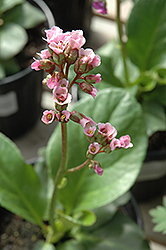>> Home
Red Beauty Bergenia
Bergenia cordifolia 'Red Beauty'
Height: 15 inches
Spread: 18 inches
Sunlight:
![]()
![]()
![]()
Hardiness Zone: 3a
Other Names: Giant Rockfoil, Largeleaf Saxifrage, Pigsqueak
Description:
A popular coarse groundcover plant with large, succulent leaves which develop a deep red cast in fall; showy carmine-red flowers in spring; best where its large foliage can be put to good use in the landscape
Ornamental Features
Red Beauty Bergenia features unusual spikes of rose flowers with red eyes rising above the foliage from early to mid spring, which emerge from distinctive red flower buds. Its attractive large succulent oval leaves are forest green in colour. As an added bonus, the foliage turns a gorgeous dark red in the fall.
Landscape Attributes
Red Beauty Bergenia is an herbaceous evergreen perennial with a ground-hugging habit of growth. Its wonderfully bold, coarse texture can be very effective in a balanced garden composition.
This is a relatively low maintenance plant, and is best cleaned up in early spring before it resumes active growth for the season. Deer don't particularly care for this plant and will usually leave it alone in favor of tastier treats. It has no significant negative characteristics.
Red Beauty Bergenia is recommended for the following landscape applications;
- Mass Planting
- Border Edging
- General Garden Use
- Groundcover
Planting & Growing
Red Beauty Bergenia will grow to be about 12 inches tall at maturity, with a spread of 18 inches. Its foliage tends to remain dense right to the ground, not requiring facer plants in front. It grows at a medium rate, and under ideal conditions can be expected to live for approximately 10 years. As an evegreen perennial, this plant will typically keep its form and foliage year-round.
This plant performs well in both full sun and full shade. It is very adaptable to both dry and moist locations, and should do just fine under typical garden conditions. It is considered to be drought-tolerant, and thus makes an ideal choice for a low-water garden or xeriscape application. It is not particular as to soil type or pH. It is highly tolerant of urban pollution and will even thrive in inner city environments. This is a selected variety of a species not originally from North America. It can be propagated by division; however, as a cultivated variety, be aware that it may be subject to certain restrictions or prohibitions on propagation.
